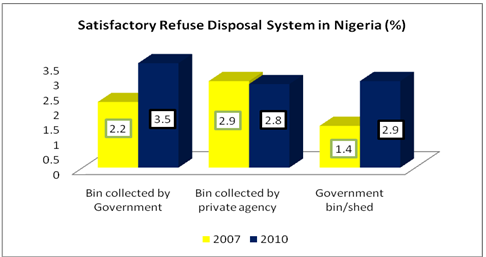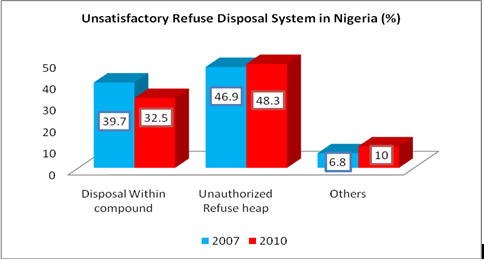How waste management, clean cities are interconnected
Despite the policies on environmental protection and improvement, waste management remains one of the major challenges faced in Nigeria especially in major cities such as Lagos, Edo, FCT Abuja, just to mention a few.
Nigeria’s huge population which is estimated at about 190 million inhabitants generate humongous waste daily. This is as there is no commensurate investment in waste management to convert the waste into wealth thereby alleviating poverty.
According to the data from BioEnergy Consult, which shows that out of 32 million tons of solid waste generated by Nigerians annually, only 20 to 30 per cent of the solid waste are collected leaving the remaining 70 per cent lying on the streets, motorways, walkways and even waterways.
In advanced countries, measures are being taking by both the government and private sectors on waste management to ensure safe and conducive living environment for citizens of their countries through implementation of efficient waste management infrastructure and processes.
Analysts have the consensus opinion that there is need for impact investors to support innovations that can improve efficiency in waste management. With the on-going global policies by major economies to address climate issues and corporate objectives directed towards creating a clean environment, environmental impact investments have been at the top of the list of investment decisions countries are making in recent times.
In India for instance, $6.5 million (Rs. 44 crore) was invested in waste management by Nepra Resource Management Pvt Ltd as well as Aavishkaar-Intellecap Group and Asha Impact.


Impact of improper waste disposal
The people at the receiving end of unsatisfactory disposal of waste are those in areas where waste disposal channels are ineffective and mostly the victims are school children, waste workers and those living close to waste dump sites.
Contaminated water causes viral diseases like cholera, dysentery, typhoid fever and other skin conditions like scabies and trachoma. The contaminated water also harbours the fish and other sea foods we consume.
In Nigeria, 7.8 percent, 10.1 percent and 5.1 percent of the waste pickers suffered from typhoid, dysentery and cholera respectively according to the 2015 Global Waste Management Outlook by the United Nations Environment Programme (UNEP) and The International Solid Waste Association (ISWA).
According to the report released by the Nigeria Centre for Disease Control (NCDC) in September 2018, Nigeria recorded a total of 27,927 cases of cholera outbreak and 517 deaths in 19 states in 2018.
Open burning of accumulated waste is quite widely practised to reduce waste collected by individuals where waste collection service is inexistent or ineffective. The emissions associated with these include dioxins, polyaromatic hydrocarbons (PAHs) and black carbon (BC), which are highly toxic to human health and environment.
Empirical evidence has shown that whenever there is an outbreak of diseases as s result of the intake of contaminated food or water, the economic activities of the region or state are stalled. This manifests in the forms of absenteeism from work or upsurge in out of pocket expenditure particularly in countries where health insurance is poorly implemented or non-existent. Also, improper disposal of wastes in areas of high agricultural activities can be harmful to plants or even lead to their death. This can cause reduction in food supply and losses to the farmers.
Preventive measures to be taken
The Nigerian government and its parastatals particularly the Federal Environmental Protection Agency (FEPA), Environmental Protection Commission (SEPCO) therefore should create an enabling framework that will attract private sectors to invest in waste collection, storage, recycling and reusing in a way that will not endanger human lives and the environment as well.
They should also intensify more efforts on carrying out effective environmental compliance monitoring and enforcement exercises to regulate the activities of the private sectors towards ensuring efficient waste disposal management and protection of citizens’ wellbeing, through adequate prevention of air, land and water pollution.
Companies, especially manufacturing companies should be sensitized on the importance of recycling and proper waste disposal and while disciplinary actions should be taken against companies that fail to comply. It is interesting to note that some manufacturing companies (that make use of plastics) have introduced a recall on plastics, which is an incentive they aim to use to reduce large amount of waste generated from their products from the societies.
Constant sensitization of the public across all the states of the federation on the need for proper waste disposal should be on top of the list; enlightening the public on the dangers of pollution caused by improper disposal of waste on human health and the environment becomes pertinent.
Role of impact investors
The interests of impact investors are not limited to making superior, long-term, risk-adjusted returns, but also in ensuring that their investments have a positive impact on the environment. These investments could be in bin placements, waste collection route-planning, provision of landfill site, construction and operation of material recovery centres, purchasing of new compactors to increase waste collection capacity and upgrade of existing waste depots and transfer loading stations.
Food spoilage and wastage are increasing in Nigeria due to insufficient storage systems. With short shelf life, some food items due to improper means of preservation spoil even before they are transported to the market. Investment in innovations for food storage and preservation (such as using natural lactic acid to reduce bacterial spoilage and increase the shelf life of juices, meat, vegetables and bakery products) can help reduce the amount of food waste.
Investment in plastic and polythene recycling can help reduce the number of plastic cans and polythene bags polluting the rivers and oceans. By investing in waste management, public health will be improved, and a cleaner environment will be assured implying that more jobs will be created and it will have positive effect in boosting tourism and attracting investment decisions by visitors who enjoy clean city.

